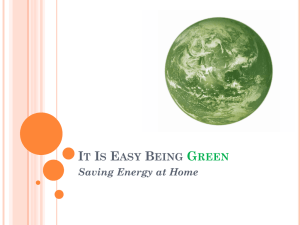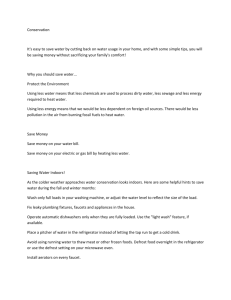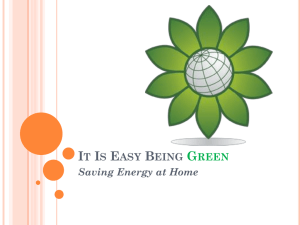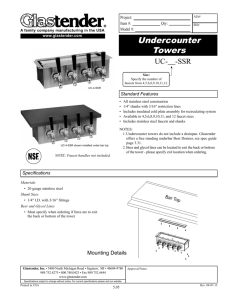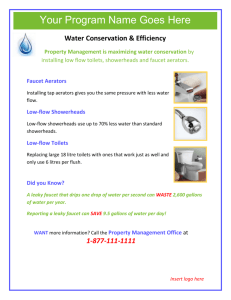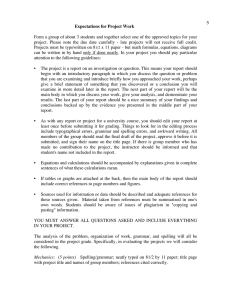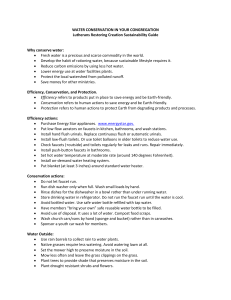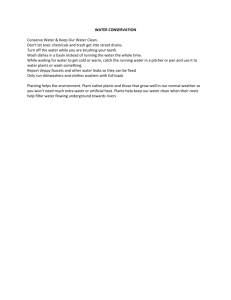Ultra-Low-Flow Faucets S
advertisement
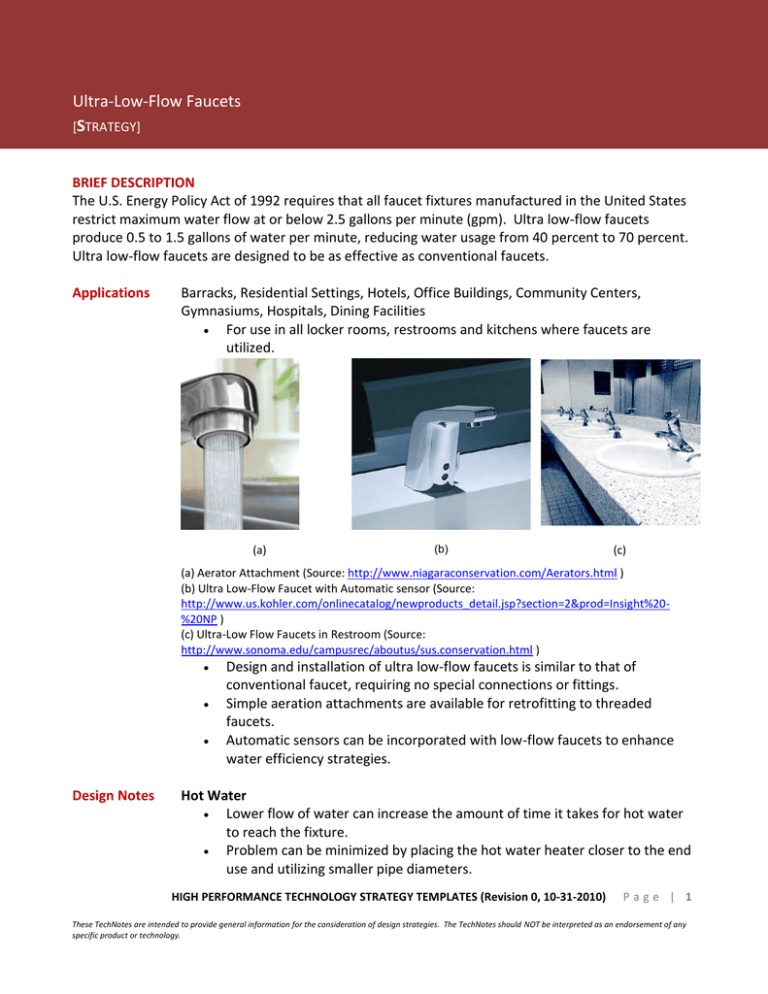
Ultra-Low-Flow Faucets [STRATEGY] BRIEF DESCRIPTION The U.S. Energy Policy Act of 1992 requires that all faucet fixtures manufactured in the United States restrict maximum water flow at or below 2.5 gallons per minute (gpm). Ultra low-flow faucets produce 0.5 to 1.5 gallons of water per minute, reducing water usage from 40 percent to 70 percent. Ultra low-flow faucets are designed to be as effective as conventional faucets. Applications Barracks, Residential Settings, Hotels, Office Buildings, Community Centers, Gymnasiums, Hospitals, Dining Facilities For use in all locker rooms, restrooms and kitchens where faucets are utilized. (a) (b) (c) (a) Aerator Attachment (Source: http://www.niagaraconservation.com/Aerators.html ) (b) Ultra Low-Flow Faucet with Automatic sensor (Source: http://www.us.kohler.com/onlinecatalog/newproducts_detail.jsp?section=2&prod=Insight%20%20NP ) (c) Ultra-Low Flow Faucets in Restroom (Source: http://www.sonoma.edu/campusrec/aboutus/sus.conservation.html ) Design Notes Design and installation of ultra low-flow faucets is similar to that of conventional faucet, requiring no special connections or fittings. Simple aeration attachments are available for retrofitting to threaded faucets. Automatic sensors can be incorporated with low-flow faucets to enhance water efficiency strategies. Hot Water Lower flow of water can increase the amount of time it takes for hot water to reach the fixture. Problem can be minimized by placing the hot water heater closer to the end use and utilizing smaller pipe diameters. HIGH PERFORMANCE TECHNOLOGY STRATEGY TEMPLATES (Revision 0, 10-31-2010) Page | 1 These TechNotes are intended to provide general information for the consideration of design strategies. The TechNotes should NOT be interpreted as an endorsement of any specific product or technology. Ultra-Low-Flow Faucets [STRATEGY] Maintenance The use of smaller water emitting openings may cause ultra low-flow faucets to clog with debris or mineral deposits more often than conventional faucets. More frequent cleaning will help reduce any debris or mineral build-ups Related Technologies Low-flow faucets can be combined with automatic sensors. References/Useful Resources: [1] U.S. Department of Energy http://www.energysavers.gov/your_home/water_heating/index.cfm/mytopic=13050 [2] EPA WaterSense. Accessed August 2010 at http://www.epa.gov/watersense/index.html HIGH PERFORMANCE TECHNOLOGY STRATEGY TEMPLATES (Revision 0, 10-31-2010) Page | 2 These TechNotes are intended to provide general information for the consideration of design strategies. The TechNotes should NOT be interpreted as an endorsement of any specific product or technology. Ultra-Low-Flow Faucets [ENERGY AND ENVIRONMENT] Energy Savings Environmental Impacts Energy Efficiency Yields a reduction in energy to deliver and treat water. The energy required for heating hot water is reduced due to the decrease in hot water consumption Water Efficiency Contributes to a decrease in water usage and water cost, which in turn promotes a more sustainable environment. Using water more efficiently helps maintain reservoirs and groundwater levels. Guiding Principles1 Water Use Reduction (Water Efficiency) Employ strategies that in aggregate use 20 percent less water than the water use baseline calculated for the building. Specify EPA’s WaterSense-labeled products or other water conserving products, where available. Associated LEED Credits (NC 2009)2 EAc1: Optimize Energy Performance (1-19 points) Demonstrate a percentage improvement in energy performance compared to a baseline performance per ASHRAE/IESNA Standard 90.12007. WEc3: Water Use Reduction (2-4 points) Reduce total building water use by a minimum of 20 percent from baseline calculation. The baseline water use for residential and commercial faucets is 2.2 and 0.5 gallons per min (gpm), respectively. Water Use Fixture Baseline Water closet 1.6 Commercial lavatory faucets 0.5 Residential lavatory faucets 2.2 Commercial prerinse spray valves 1.6 Residential kitchen faucet 2.2 Residential showerheads 2.5 Water Efficient Target 1.1 - 1.28 0.5 0.5 - 1 TBD 1.5 - 2.2 1.5 Units Gallons per flush Gallons per minute Gallons per minute Gallons per minute Gallons per minute Gallons per minute 1 Guiding Principles for Federal Leadership in High Performance and Sustainable Buildings www.wbdg.org/pdfs/hpsb_guidance.pdf 2 USGBC LEED Reference Guide for Green Building Design and Construction, 2009 Edition HIGH PERFORMANCE TECHNOLOGY STRATEGY TEMPLATES (Revision 0, 10-31-2010) Page | 3 These TechNotes are intended to provide general information for the consideration of design strategies. The TechNotes should NOT be interpreted as an endorsement of any specific product or technology. Ultra-Low-Flow Faucets [PRODUCT AND ECONOMICS] Product Images 3 (Source: American Standard ) Components 4 (Source: Sloan ) (Source: Niagara 5 Conservation ) Ultra Low-Flow Faucet, Aerator Attachment (where applicable), Automatic sensor (where applicable) Cost Range Components Bathroom Ultra Low-Flow Faucet Kitchen Ultra Low-Flow Faucet Ultra Low Flow Faucet with automatic sensor Aerator Attachment Product Types Cost $100 – $200 $300 – $700 $400-$700 $5 – $20 Unit per faucet per faucet Per faucet/sensor combination per attachment Aerating Faucet Aerating faucets mix air into the water stream as it leaves the faucet, reducing flow while increasing efficiency. Distribute less water over a greater area. Non-Aerating Faucet Non-aerating faucets add a pulse into the water stream which maintains the temperature while delivering a regular spray. Vendors American Standard Cadet Single Control Bathroom Faucet http://www.americanstandard-us.com/products/productDetail.aspx?id=3052 3 http://www.americanstandard-us.com/bathroom-faucets/reliant-3-centerset-bathroom-faucet/ http://www.sloanvalve.com/Our_Products/Solis_Faucet.aspx 5 http://www.niagaraconservation.com/Aerators.html HIGH PERFORMANCE TECHNOLOGY STRATEGY TEMPLATES (Revision 0, 10-31-2010) 4 Page | 4 These TechNotes are intended to provide general information for the consideration of design strategies. The TechNotes should NOT be interpreted as an endorsement of any specific product or technology. Ultra-Low-Flow Faucets [PRODUCT AND ECONOMICS] Moen Adler Chrome Two-handle Low Arc Bathroom Faucet http://www.moen.com/adler/chrome-two-handle-low-arc-bathroomfaucet/_/R-CONSUMER%3ACA84420 Delta Classic Two Handle Centerset Lavatory Faucet http://www.deltafaucet.com/bath/details/2520.html Sloan SOLIS Faucets http://www.sloanvalve.com/Our_Products/Solis_Faucet.aspx Warranty Info Varies, 0 – 2 years depending on brand. Code Restrictions None. HIGH PERFORMANCE TECHNOLOGY STRATEGY TEMPLATES (Revision 0, 10-31-2010) Page | 5 These TechNotes are intended to provide general information for the consideration of design strategies. The TechNotes should NOT be interpreted as an endorsement of any specific product or technology. Ultra-Low-Flow Faucets [SPECIFICATIONS] GENERAL6 FAUCETS & AERATORS A. Water flow and consumption rates for plumbing fixtures: 1. Comply with requirements in Public Law 102-486, Energy Policy Act. 2. Provide WaterSense labeled products for High-Efficiency Lavatory Faucets. B. Fixtures: 1. Water management: Provide low flow fixtures and automatic, sensor operated faucets, when appropriate. Provide automatic, sensor operated faucets to comply with ASSE 1037 and UL1951. a. 2. Faucets and aerators: WaterSense labeled. Flow rate should be between 0.5 and 1.5 gal/min when measured at a flowing water pressure of 60 pounds per square inch (psi). Toxicity/IEQ: a. Traps: Provide traps with removable access panels for easy clean-out at sinks b. Water filter systems: Provide filters for chlorine at sinks. c. Low corrosion flux for copper pipe: Comply with ASTM B813. 6 Specification language modified from the Whole Building Design Guide’s Federal Green Construction Guide for Specifiers, Section 22 40 00 (15400) Plumbing Fixtures. Accessed August 2010 at http://www.wbdg.org/ccb/browse_org.php?o=84 (last updated January 2010). HIGH PERFORMANCE TECHNOLOGY STRATEGY TEMPLATES (Revision 0, 10-31-2010) Page | 6 These TechNotes are intended to provide general information for the consideration of design strategies. The TechNotes should NOT be interpreted as an endorsement of any specific product or technology. Ultra-Low-Flow Faucets [CASE STUDY] Huntington Veteran Affairs Medical Center Huntington, West Virginia Site Location Facility Approach Results Huntington Veteran Affairs Medical Center is an acute medical and surgical care facility serving veterans in West Virginia, Ohio and Kentucky. Facility is comprised of 24 buildings or a total of 635,000 square feet. The approximately 1,000 professional, technical, and support personnel at Huntington VA Medical Center served 293,000 outpatients and 4,200 inpatients in 2008. Large retrofit of faucets and showerheads was implemented in offices, clinics, a surgery unit, patient rooms, and laboratories. Replaced 178 faucets that functioned at 2.5 gallons per minute (gpm) with units that functioned at 1.5 gpm. Replaced 33 showerheads that functioned at 2.2 gpm with models that functioned at 1.75 gpm. Replaced toilets with both high-efficiency units and dual flush units. The retrofit effort saved over 1.5 million gallons of water annually, based on metered pre- and post- retrofit data and average occupancy rates. Using a combined water and sewer cost of $10 per thousand gallons, cost savings was $12,000 per year. Energy savings of 5,800 therms per year was achieved as a result of the reduced hot water consumption, or an additional cost savings of $7,200 per year. References/Useful Resources: [1] U.S. Department of Energy, Huntington Veterans Affairs Medical Center—Faucet and Showerhead Replacement Project, http://www1.eere.energy.gov/femp/pdfs/huntingtonva_watercs.pdf HIGH PERFORMANCE TECHNOLOGY STRATEGY TEMPLATES (Revision 0, 10-31-2010) Page | 7 These TechNotes are intended to provide general information for the consideration of design strategies. The TechNotes should NOT be interpreted as an endorsement of any specific product or technology.
